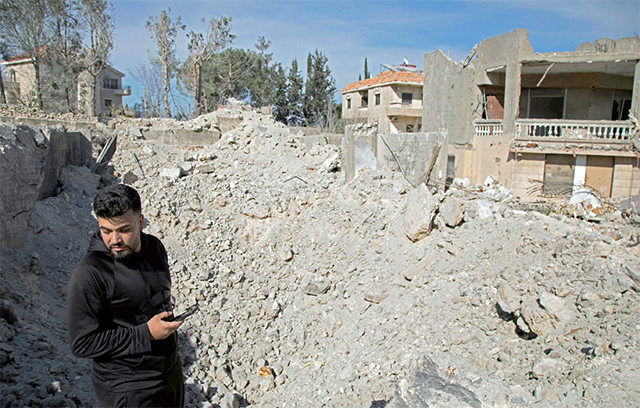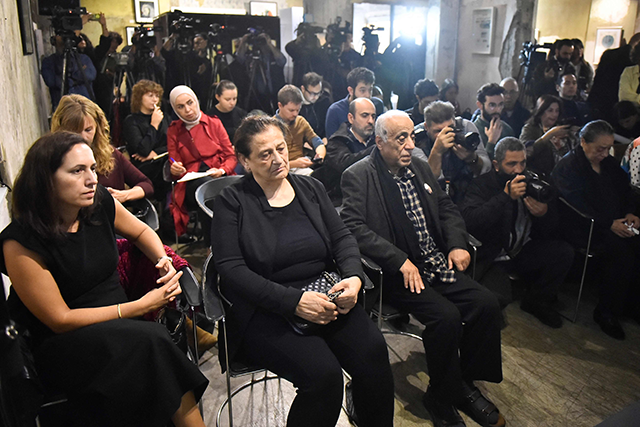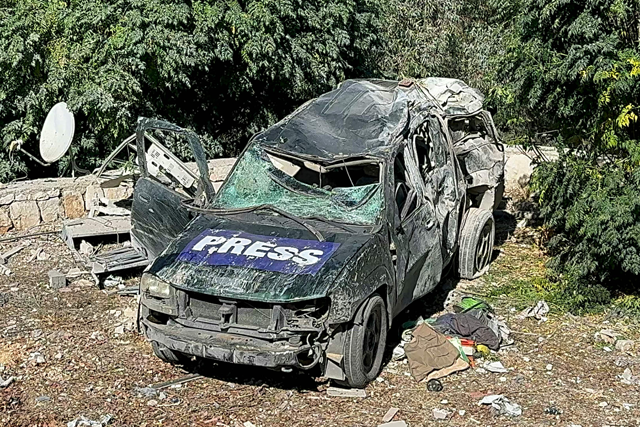You are here
UN urged to probe deadly Israel strikes against journalists in Lebanon
By AFP - Feb 28,2024 - Last updated at Feb 28,2024

A resident inspects the damage due to Israeli bombardment in the southern Lebanese village of Kherbet Selm near the border on Wednesday (AFP photo)
BEIRUT — More than 120 individuals and groups on Wednesday called for a United Nations probe into Israeli attacks on journalists in south Lebanon, where three were killed last year.
An appeal addressed to UN rights chief Volker Turk expressed concern over "the Israeli forces' apparent deliberate targeting of journalists and media workers in Lebanon".
An AFP investigation into strikes on October 13 that killed Reuters journalist Issam Abdallah and wounded six others, including AFP photographer Christina Assi critically and AFP video journalist Dylan Collins, pointed to a tank shell only used by the Israeli army in the border region.
On November 21, Farah Omar and Rabih Maamari from the pro-Iranian channel Al Mayadeen were killed in Israeli strikes on southern Lebanon, the broadcaster and official media said.
The letter to Turk urged "an investigation to establish the facts and circumstances" around the attacks and for the findings to be published "with a view to holding those responsible accountable".
Signatories included the Committee to Protect Journalists, local and regional rights groups, Lebanese lawmakers and media outlets including Al Jazeera, as well as AFP's Collins and Assi.
A separate letter, sent to UNESCO chief Audrey Azoulay, urged her office to “advocate for accountability for the apparent war crimes committed by Israel in south Lebanon”.
In December, Israel’s forces said the October strikes occurred in an “active combat zone” and were under review.
Following the November strike, the Israeli military said it was aware of a claim regarding journalists in the area who were killed as a result army fire.
It added that there were “active hostilities” in the area and that the incident was under review.
The AFP investigation into the October strikes, jointly conducted with Airwars, an NGO that investigates attacks on civilians in conflict situations, found the attack involved a 120mm tank shell only used by the Israeli forces in this region.
A Reuters investigation found that two Israeli tank rounds fired from the same position across the border were used in the attack.
Human Rights Watch concluded that the October strikes were “apparently deliberate attacks on civilians, which is a war crime” and which “should be prosecuted or may be prosecuted for war crimes”.
France’s foreign ministry in December said “all light” must be shed on the October 13 strikes, while US top diplomat Antony Blinken welcomed an Israeli investigation into the strike as “important and appropriate”.
Related Articles
BEIRUT — The Israeli strike that killed one journalist and wounded six others in Lebanon merits a "war crime" investigation, rights groups A
BEIRUT — Lebanon said on Monday it had submitted a complaint to the United Nations Security Council over an Israeli strike last week that ki
BEIRUT — Lebanon said on Saturday that Israel was behind cross-border fire that killed a Reuters journalist and wounded six others near the



















